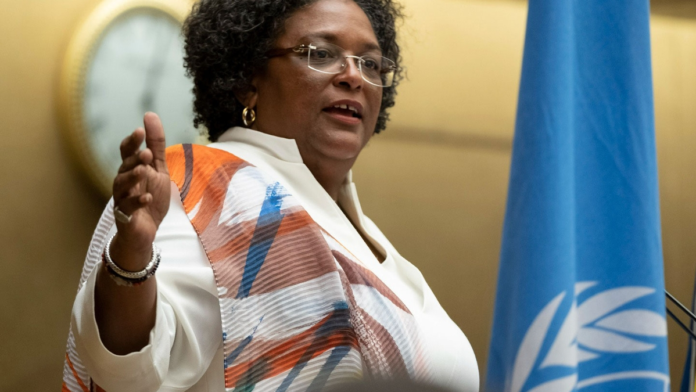In a bold move aimed at regional transformation, CARICOM has unveiled sweeping plans to reform the Caribbean’s telecommunications, trade, and education sectors — changes expected to significantly impact the region’s economic and social landscape.
At the closing press conference of the 48th Regular Meeting of the Conference of Heads of Government of CARICOM, Barbados Prime Minister Mia Mottley revealed that CARICOM is in the early stages of reviewing the use of popular US platforms such as Netflix and WhatsApp across the Caribbean. Despite being widely used in the region, these platforms contribute little to no revenue for the Caribbean economy.
“Many of us use WhatsApp, Netflix — all of these things for which there is little to no payment. The reality is that these entities earn as much as US$11.6 billion a year, yet they pay no taxes and make no contribution in any way to the regional economy,” Mottley said.
She further highlighted that this lack of revenue has hindered regional telecommunications companies from reinvesting in the necessary infrastructure to strengthen the Caribbean’s telecommunications networks. The move comes after a comprehensive review of the telecommunications sector, led by the Caribbean Private Sector Organization (CPSO), which included input from non-CARICOM territories like the Dominican Republic and Puerto Rico, given their significant roles in regional telecommunications.
“We are conscious that the Caribbean, as small states, has higher telecommunications costs than we would like to see, compared with other regions,” Mottley noted.
To address this issue, CARICOM has tasked a group of regional leaders, including Premier of Nevis Mark Brantley, Prime Minister of Grenada Dickon Mitchell, and Mottley, to explore strategies that will create a fair and competitive environment for both consumers and service providers.
Meanwhile, CARICOM is also preparing for potential changes in US tariffs, which could reshape the trade landscape between the Caribbean and the United States. Jamaican Prime Minister Dr. Andrew Holness emphasized that while these changes may disrupt the usual trade routine, they could also present significant opportunities for the region.
“With these changes, the concerns shouldn’t only be about disruptions in the normal routine of trade but also about the great opportunities they could present for the region,” Holness remarked.
Holness urged businesses and private stakeholders to remain calm, assuring them that CARICOM’s established trade negotiation mechanisms are actively assessing potential challenges and guiding member governments in adjusting trade policies to mitigate risks while capitalizing on new opportunities.
“We’re dealing with speculation right now as to what the tariffs could be; there’s been no announcement specific to the CARICOM region. What we are being is proactive and prepared,” Holness added. CARICOM expects to complete a detailed review within three to four months, and the resulting policy document will offer strategic advice to member governments.
In addition to telecommunications and trade, CARICOM is also embarking on significant reforms to the region’s educational systems. Prime Minister Mottley announced that the community will establish a CARICOM Educational Transformation Commission to redesign education in the region. The commission will oversee changes to secondary education, including the way CXC examinations are conducted, and develop new educational targets that align with the needs of the modern Caribbean.
“We all accept that our educational systems are not fit for purpose. They were designed for a colonial period, with a hierarchical structure that only saw a few of our people and not all of our people,” Mottley stated.
The reforms will also extend to tertiary education. The CARICOM Educational Transformation Commission has agreed to work on a treaty to bring The University of the West Indies (UWI) under new governance, ending its oversight under a royal charter. Mottley described this governance structure as outdated and emphasized the need for a change in the current era.
“The time has come now,” Mottley declared.
With these initiatives, CARICOM is poised to bring about transformative changes that will not only enhance regional economic development but also ensure that the Caribbean’s educational systems and trade policies are better suited to the needs of today’s globalized world.
















